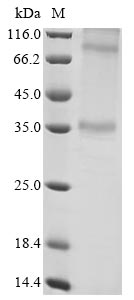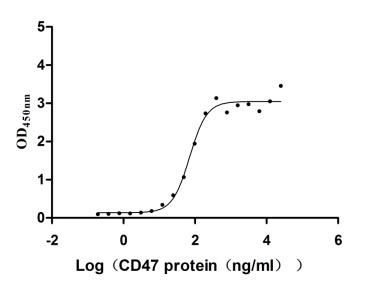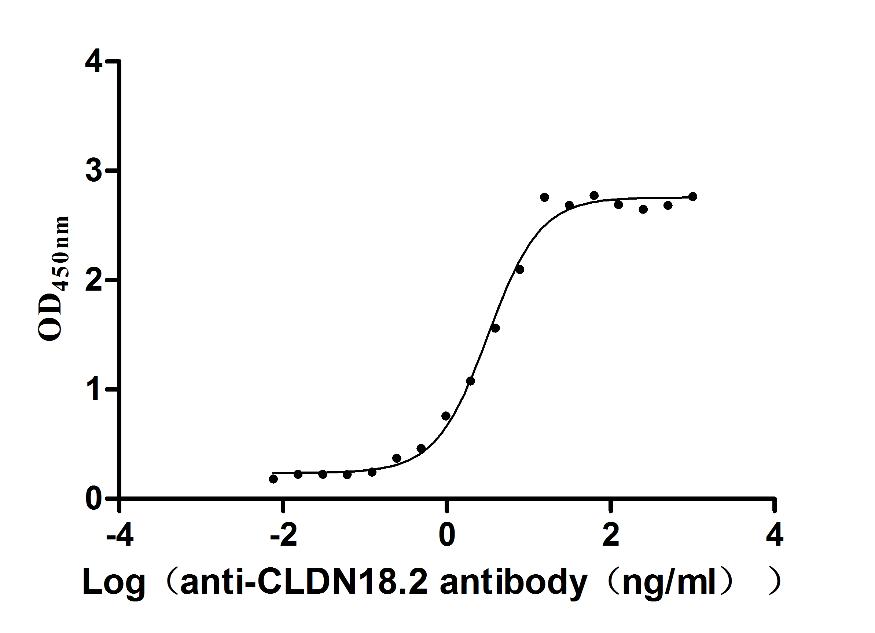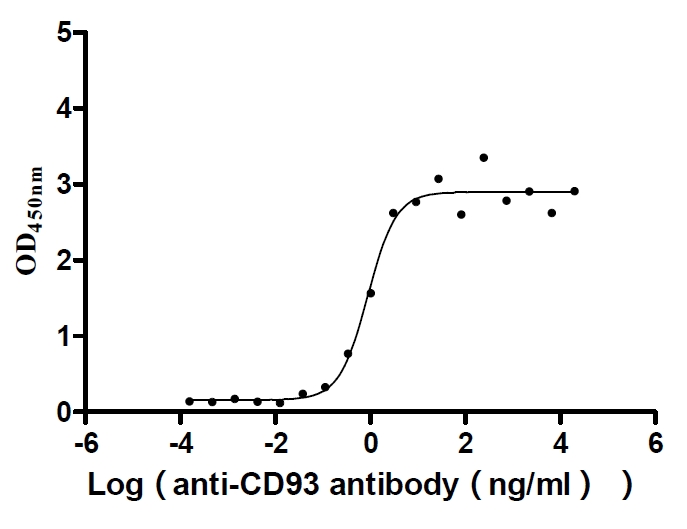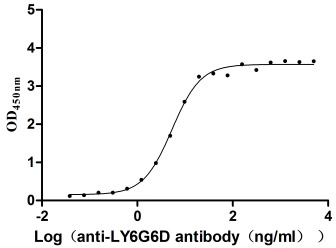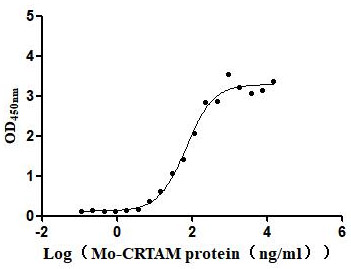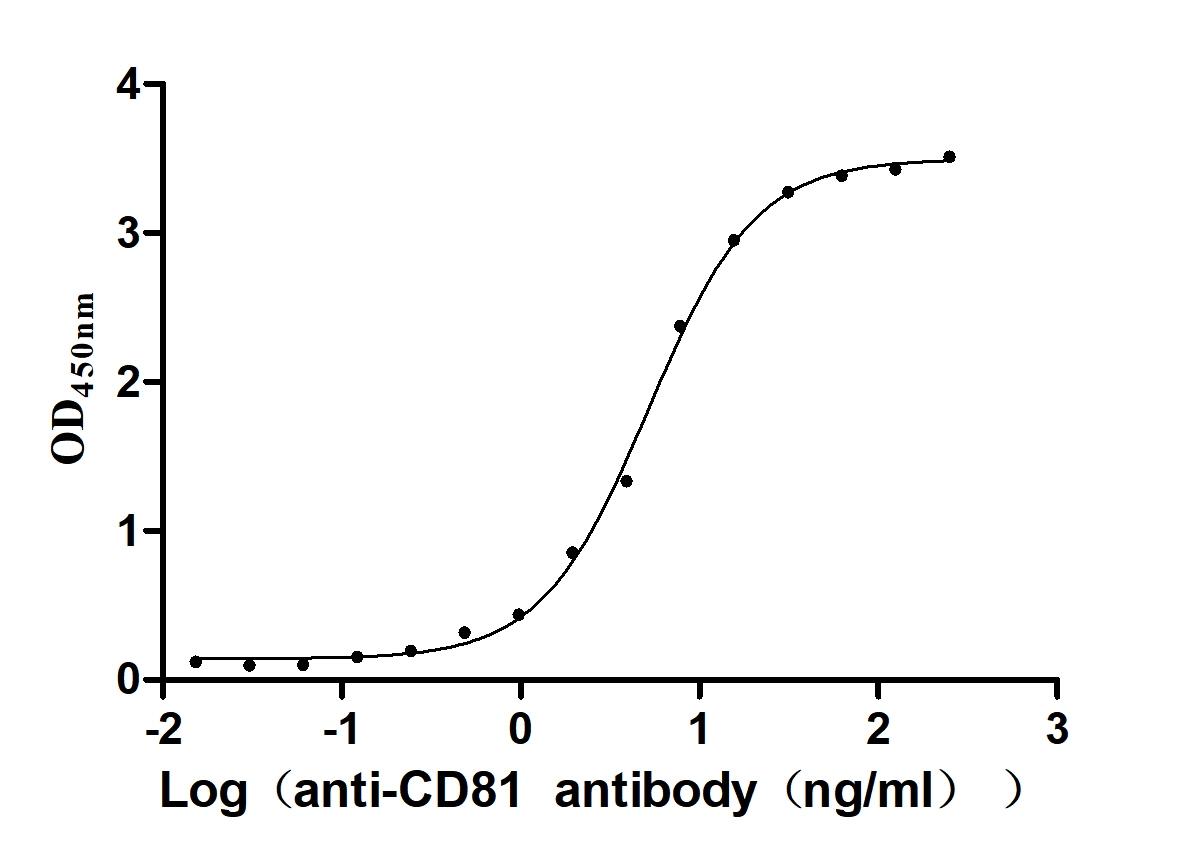Recombinant Human Adenosine receptor A1 (ADORA1)
In Stock-
货号:CSB-CF001375HU
-
规格:¥9720
-
图片:
-
其他:
产品详情
-
纯度:Greater than 85% as determined by SDS-PAGE.
-
基因名:
-
Uniprot No.:
-
别名:ADORA1; Adenosine receptor A1
-
种属:Homo sapiens (Human)
-
蛋白长度:Full Length
-
来源:in vitro E.coli expression system
-
分子量:39.3 kDa
-
表达区域:1-326aa
-
氨基酸序列MPPSISAFQAAYIGIEVLIALVSVPGNVLVIWAVKVNQALRDATFCFIVSLAVADVAVGALVIPLAILINIGPQTYFHTCLMVACPVLILTQSSILALLAIAVDRYLRVKIPLRYKMVVTPRRAAVAIAGCWILSFVVGLTPMFGWNNLSAVERAWAANGSMGEPVIKCEFEKVISMEYMVYFNFFVWVLPPLLLMVLIYLEVFYLIRKQLNKKVSASSGDPQKYYGKELKIAKSLALILFLFALSWLPLHILNCITLFCPSCHKPSILTYIAIFLTHGNSAMNPIVYAFRIQKFRVTFLKIWNDHFRCQPAPPIDEDLPEERPDD
Note: The complete sequence including tag sequence, target protein sequence and linker sequence could be provided upon request. -
蛋白标签:N-terminal 10xHis-tagged
-
产品提供形式:Liquid or Lyophilized powder
Note: We will preferentially ship the format that we have in stock, however, if you have any special requirement for the format, please remark your requirement when placing the order, we will prepare according to your demand. -
缓冲液:If the delivery form is liquid, the default storage buffer is Tris/PBS-based buffer, 5%-50% glycerol. If the delivery form is lyophilized powder, the buffer before lyophilization is Tris/PBS-based buffer, 6% Trehalose, pH 8.0.
-
复溶:We recommend that this vial be briefly centrifuged prior to opening to bring the contents to the bottom. Please reconstitute protein in deionized sterile water to a concentration of 0.1-1.0 mg/mL.We recommend to add 5-50% of glycerol (final concentration) and aliquot for long-term storage at -20°C/-80°C. Our default final concentration of glycerol is 50%. Customers could use it as reference.
-
储存条件:Store at -20°C/-80°C upon receipt, aliquoting is necessary for mutiple use. Avoid repeated freeze-thaw cycles.
-
保质期:The shelf life is related to many factors, storage state, buffer ingredients, storage temperature and the stability of the protein itself.
Generally, the shelf life of liquid form is 6 months at -20°C/-80°C. The shelf life of lyophilized form is 12 months at -20°C/-80°C. -
货期:3-7 business days
-
注意事项:Repeated freezing and thawing is not recommended. Store working aliquots at 4°C for up to one week.
-
Datasheet & COA:Please contact us to get it.
相关产品
靶点详情
-
功能:Receptor for adenosine. The activity of this receptor is mediated by G proteins which inhibit adenylyl cyclase.
-
基因功能参考文献:
- ADORA1 is not a common risk factor or causal gene for Parkinson's disease or dementia with Lewy bodies in the European population PMID: 27987235
- monocyte-derived macrophages from ankylosing spondylitis patients expressed increased levels of A2AAR and reduced levels of A1 and A2BAR compared to healthy controls PMID: 29524036
- studies revealed individual trait characteristics for being either vulnerable or resilient to both alcohol and to sleep deprivation. Both interventions induce gradual increases in cerebral A1AR availability, pointing to a potential common molecular response mechanism. PMID: 30012607
- Data suggested that adenosine A1 receptor might potentiate glycinergic transmission through Galphai/PKA/alpha3 and Gbetagamma/alpha1ins pathways in inflamed rat. PMID: 28882563
- Elevated A1 adenosine receptor is associated with sleep deprivation. PMID: 28373571
- Mutation in ADORA1 may be associated with early-onset parkinsonism and cognitive dysfunction. PMID: 27134041
- Inhibition of cholinergic neurotransmission by beta3-adrenoceptors results from adenosine release via equilibrative nucleoside transporters and prejunctional A1-receptor stimulation in urinary bladder. PMID: 28446460
- This study showed that increased neuronal A1R expression in Rasmussen Encephalitis may be involved in prevention of seizures spread and seizures-induced damage, limitation of both seizures and inflammation atrophy in 1 cerebral hemisphere. PMID: 28789481
- A1R signaling enhances A2AR-mediated neurodegeneration [review] PMID: 28441750
- Mutational and computational analysis of A1-AR revealed a distinct conformation of the second extracellular loop and a wider extracellular cavity with a secondary binding pocket that can accommodate orthosteric and allosteric ligands. PMID: 28235198
- second extracellular loop is a key allosteric ligand-binding determinant. PMID: 27683013
- this study highlights a key role for extracellular loop 2 in A1AR orthosteric ligand binding and receptor activation. PMID: 27683014
- Dysregulation in ADORA1/ADORA2A expression was associated with glioma development. PMID: 27038930
- A1R mRNA levels and A1R density in PBMCs from idiopathic normal-pressure hydrocephalus patients were significantly lower than control subjects PMID: 26810542
- Its central activation could be and approach to achieving a shifted homeostasis in which physiology is downregulated to a homeostatically-regulated, stable hypometabolic state. (review) PMID: 27333659
- In postmortem human prefrontal cortex, adenosine A1 receptor is coupled preferentially, if not exclusively, to Galphai-3. PMID: 26213104
- Results show that ADORA1 rs2228079 and ADORA2A rs5751876 polymorphisms are associated with the risk of Gilles de la Tourette Syndrome, co-morbid disorders, and may affect the age of tics onset in Polish population. PMID: 26317759
- It has the intrinsic ability to form a heteromeric complex with metabotropic glutamate receptor type 1 and mutually modulate signaling. PMID: 26154847
- Paeoniflorin promotes the survival of cultured cortical neurons by increasing Akt and ERK1/2 phosphorylation via A1R-mediated transactivation of EGFR. PMID: 25661317
- Adenosine A1 receptor activation increases ENT1 activity via protein kinase C. PMID: 25725289
- This study revealed variation of regional A1AR availability associated with ADORA1 and particularly ADORA2A SNPs, several of which had previously been shown to be associated with increased anxiety and panic disorder. PMID: 24943643
- Stimulation of A1AR and A2BAR had a prominent anti-proliferative/pro-apoptotic effect on the glioblastoma stem cells. PMID: 25429616
- Results document that endogenously formed adenosine can chaperone its cognate A1 receptor. PMID: 25354767
- Results suggest that the anti-cancer effect of Omega-3 polyunsaturated fatty acids (Omega-3 PUFAs) on gastric cancer is at least partly dependent on activating the ADORA1-mediated apoptosis pathway. PMID: 24896321
- regulation of GABA uptake occurs via modulation of the GABA transporters by the adenosine A1 (A1R) and A2A (A2AR) receptors PMID: 23657626
- Induction of renal proximal tubular IL-11 is a critical intermediary in A1 adenosine receptor-mediated renal protection against acute ischemic kidney injury. PMID: 23813214
- Adenosine regulates bone metabolism via A1, A2A, and A2B receptors. PMID: 23682121
- Imiquimod suppresses propagation of herpes simplex virus 1 by upregulation of cystatin A via the adenosine receptor A1 pathway PMID: 22787201
- A1/A2 adenosine receptor activation does not directly contribute to cutaneous active vasodilatation. PMID: 22356216
- A(1) and A(2B)ARs could be potential biomarkers able to provide an early indication of SA risk and their stimulation may turn out to improve fetoplacental perfusion by increasing vascular endothelial growth factor (VEGF) and nitric oxide (NO). PMID: 22867902
- In patients with stable angina ADORA1 agonist capadenoson lowers exercise heart at comparable maximum workload, which is associated with improved total exercise time and prolongation of time to ischaemia. PMID: 22370739
- Results indicate a role for adenosine receptor A1 and A2A gene polymorphisms in susceptibility to apnoea of prematurity and bronchopulmonary dysplasia and in interindividual variability to caffeine response. PMID: 22462821
- Data suggest that expression of ADORA1 is too low to play a major role in regulation of lipogenic gene expression in hepatocytes; studies include investigation of gene expression under influence of ADORA1 agonists. PMID: 22449383
- data show that expression of A1Rs induced adipocyte differentiation, whereas A2bR expression inhibited adipogenesis and stimulated an osteoblastic phenotype PMID: 21730968
- AMP and a non-hydrolyzable AMP analog (deoxyadenosine 5'-monophosphonate, ACP) directly activated the adenosine A(1) receptor PMID: 22215671
- Inhibition of human mast cell activation would be a mechanism for A AR antagonists, but not A(2B) AR antagonists. PMID: 21506953
- Adenosine receptor expression and activation during the differentiation of mesenchymal stem cell to osteoblasts and adipocytes, was investigated. PMID: 21590734
- two genes involved in cardiovascular diseases, ADORA1 and PTGDS, were differentially up-regulated in epicardial adipose tissue compared to mediastinal and subcutaneous adipose tissue PMID: 21603615
- Data suggest that adenosine deficiency may be relevant to human epilepsy and that a ketogenic diet can reduce seizures by increasing adenosine A1 receptor-mediated inhibition. PMID: 21701065
- ADORA1 was expressed in nucleus, perinucleus and cytoplasm of retinal pigment epithelium. PMID: 21542986
- report implicating genetic variability in the A1AR with post-traumatic seizures. PMID: 20609566
- LUF5834 represents a novel high affinity radioligand for the A(1)R and may prove a useful tool to provide estimates of inverse agonist efficacy at this receptor. PMID: 20599769
- results suggest that adenosine-mediated signaling in the heart requires a balance between A(1)- and A(2A)-receptors PMID: 20354569
- Report fluorescence-based techniques, and in particular the development of fluorescent ligands, so study pharmacology of the adenosine A1 receptor. PMID: 20105183
- Findings suggest that the adenosine A1 (and possibly coordinated with A2a) receptors contribute to dendritic cell differentiation and survival. PMID: 20085598
- Studies indicate that adenosine mediates its actions by means of activation of specifiic G protein-coupled receptors, for which 4 subbtypes: A1R, A2AR, A2BR and A3R have been identified so far. PMID: 19883624
- Adenosine, thus, suppresses CW2 human colonic cancer growth by inducing apoptosis as mediated via A(1) adenosine receptors. PMID: 19822392
- Data suggest that adenosine receptor modulation may be useful for refining the use of chemotherapeutic drugs to treat human cancer more effectively. PMID: 19794965
- ADORA1 polymorphisms may represent good candidate markers for schizophrenia research and ADORA1 may be involved in the pathophysiological mechanisms of schizophrenia in Japanese populations PMID: 19820430
- Human A1 adenosine receptor overexpressed in adipose tissue of transgenic mice protects them from obesity-related insulin resistance. PMID: 11703426
显示更多
收起更多
-
亚细胞定位:Cell membrane; Multi-pass membrane protein.
-
蛋白家族:G-protein coupled receptor 1 family
-
数据库链接:
HGNC: 262
OMIM: 102775
KEGG: hsa:134
STRING: 9606.ENSP00000308549
UniGene: Hs.77867
Most popular with customers
-
Express system: Mammalian cell
Species: Homo sapiens (Human)
-
Recombinant Macaca fascicularis Claudin (CLDN18)-VLPs (Active)
Express system: Mammalian cell
Species: Macaca fascicularis (Crab-eating macaque) (Cynomolgus monkey)
-
Recombinant Human Complement component C1q receptor (CD93), partial (Active)
Express system: Mammalian cell
Species: Homo sapiens (Human)
-
Recombinant Macaca fascicularis lymphocyte antigen 6 family member G6D (LY6G6D) (Active)
Express system: Yeast
Species: Macaca fascicularis (Crab-eating macaque) (Cynomolgus monkey)
-
Recombinant Mouse Cell adhesion molecule 1 (Cadm1), partial (Active)
Express system: Mammalian cell
Species: Mus musculus (Mouse)
-
Recombinant Human CD81 antigen (CD81), partial (Active)
Express system: Mammalian cell
Species: Homo sapiens (Human)
-
Recombinant Human Cytotoxic and regulatory T-cell molecule (CRTAM), partial (Active)
Express system: Mammalian cell
Species: Homo sapiens (Human)

